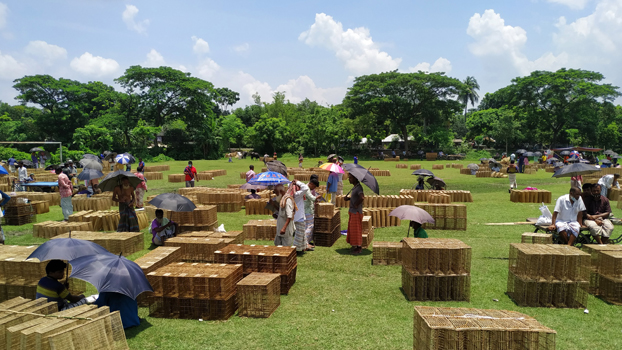Bamboo-made fish trap market in Chalanbeel turns desolate


Although monsoon started quite a long ago, the local markets selling fishing trap in the Chalanbeel area of Pabna’s Chatmohar are yet to get busy.
Buyers and sellers said that due to the impact of corona pandemic, ongoing lockdown and insufficient water in the rivers canals of the area and the widespread use of current nets and china nets, the markets of native bamboo made fishing trap including Khalsuni, Vair and Dhundi have not become busy yet.
Every Sunday from morning till afternoon, Khalsuni, Vair, Dhundi are bought and sold at Amritkunda Hat in Chatmohar. Last Sunday, it was seen that due to the lockdown, the number of people gathering at the market is lesser and the buying and selling is also low.
Apart from this hat, these fishing trap are sold at wholesale and retail level at Naogaon Hat, Gulta Hat, Nimgachir Hat of Raiganj, Salanga Hat, Chaikola Hat of Chatmohar, Mirzapur Hat, Chachkair Hat and other haats in Chalanbeel area.
In other years, wholesalers from Pabna, Natore, Sirajganj and other parts of the country come to these haats and buy these fishing traps and supply them to different parts of the country including Dhaka, but this time the wholesalers are not coming to these haats very often.
Due to lack of work in the rainy season, thousands of needy people in the Chalanbeel region became involved in fishing for a living. That is why Khalsuni, Dhundi and Vair are appreciated in the rainy season.
Although the work of making these fishing equipments is going on throughout the year, the busyness of the artisans making these equipments increases at this time of the year. Its full season starts from the end of Bengali month Jaistha.
Thousands of people in the surrounding areas including Chatmohar, Gurudaspur, Baraigram, Tarash, Singra of Chalanbeel area are making a living by making fishing instruments like Khalsuni, Dhundi, Vaid, Duar, made of bamboo, palm fiber and other local materials. Thousands of fishermen make a living by fishing with these devices.
No one has been able to say for sure when and where the first Khalsuni was started in the Chalanbeel area. The local Khalsuni makers said that many of them have been involved in this work since the time of their ancestors whereas; many others are new to the profession.
Sajib Islam, a Khalsuni maker from Chamta village in Baraigram, inhabited by Chalanbeel, said that first the Khil is made by cutting bamboo and they are dried in the sunlight. The bamboo nails are blocked with the scales of the rotten palm Dagur.
From housewives to school-college students also help the family in these tasks. The work of making Khalsuni is going on day and night in different villages of Chalanbeel region including Chamta, Dharabarisha, Udbaria, Sithuli, Talbaria, Sirampur, Darikushi, Chandipur, Sonabaju, he added.Sajib further said that last year at this time the pair was sold at Tk 500 per pair, but this year it is being sold at Tk 350. The housemaids also help in the work and the day goes by after eating somehow.
Mahatab Uddin of Darikushi village, Ahmed Ali, Nurul Islam of Chamta village and Ashraful and other artisans and sellers of various fishing equipments said that the fishing equipments are made with bamboo, palm fiber, nylon thread.
Some make the equipments whereas some buy and sell them elsewhere. When the prices are low in winter, some people buy Khalsuni and Dhundi and sell them in the rainy season.
This year, depending on the size, each Khalsuni is being sold at a price of Tk 200 or less. Now it is safe to say that there is not enough water in the canals and beels. Fishermen are now more comfortable buying nets instead of Khalsuni, as they are catching more fish with current nets and china nets.
Producers, wholesalers and retailers, users and the general public are directly or indirectly benefiting from this bamboo dependent industry. The industry meets a large part of the demand for fish.
However, the buyers complained that most of the haats, including the Amritkunda Hat in Chatmohar, charge a lease of Tk 25 for each Khalsuni, which is very unreasonable. Buyers and sellers have sought the intervention of the concerned authorities to ensure regular collection of rent to keep the industry afloat.
Despite repeated attempts to contact Shahalam Swapan, the lessee of Amritkunda Khalsuni Hat, he did not pick up the phone.

